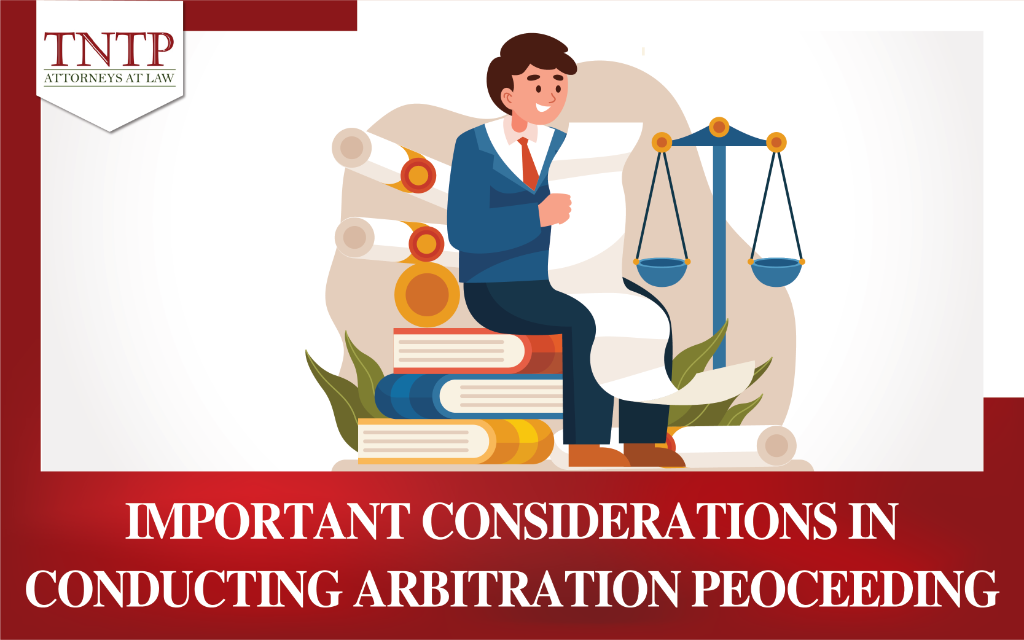Important considerations when conducting arbitral proceeding

The utilization of arbitration for dispute resolution is progressively becoming the preferred choice for numerous businesses, owing to its manifold benefits, particularly when administered through arbitration centers. The arbitral proceedings process at these centers entails notable disparities compared to litigation within conventional court systems. Within this article, we shall examine the pivotal factors businesses should consider when engaging in arbitration proceedings at arbitration centers.
1. Request for arbitration
In the event of an agreed arbitration agreement specifying the arbitration center to resolve the dispute, the claimant shall submit the request for arbitration and related documents to that arbitration center. If the parties do not specifically agree on the arbitration center with jurisdiction to resolve the dispute, they need to agree on which arbitration center the dispute is resolved. If an agreement cannot be reached, the selection of the arbitral institution to settle the dispute shall be made at the claimant’s request.
The request for arbitration includes contents as follows:
• Date of request for arbitration.
• Information about the parties involved in the dispute (plaintiff, defendant, rights holders, relevant obligations). For businesses, the necessary information includes the address, legal representative, or authorized representative (in which case information about the Power of Attorney or Authorization Contract must be provided), tax identification number, phone number, email, etc.
• Summary of the disputed content.
• Grounds for the claims (Clearly indicate the content of arbitration agreements).
• The plaintiff’s request and monetary value of the dispute.
• Other issues such as the name, and contact address of the arbitrator chosen by the plaintiff or the request for the arbitration center to appoint an arbitrator; contact information of the plaintiff;…
In addition to the request for arbitration, the plaintiff needs to prepare the following documents: Arbitration agreement; the original or certified copies of documents related to the dispute such as contracts, agreements,… These are important documents for the Arbitration Center to consider the plaintiff’s lawsuit request.
2. Statute of limitations for initiating a lawsuit for dispute settlement by arbitration
Similar to the litigation process in court, parties need to be aware of the statute of limitations for filing a lawsuit. According to Article 33 of the 2010 Commercial Arbitration Law, unless otherwise provided by specialized laws, the statute of limitations for filing a lawsuit under arbitration procedures is 02 years, starting from the time when the legitimate rights and interests were infringed.
Businesses should pay attention to the statute of limitations to ensure their rights, as in the event a business submits the request for arbitration outside the legally specified deadline, the Arbitration Center may refuse to process the lawsuit petition.
3. Costs of arbitration
An equally important consideration when proceeding with arbitration litigation is the arbitration fee. After receiving the plaintiff’s request for arbitration files, the Arbitration Center will issue a Notice on the payment of arbitration fees and send it to the plaintiff. The amount of the arbitration fee and the deadline for its payment will be determined by the Arbitration Center. If the plaintiff does not pay the full arbitration fee within the deadline set by the Center, it will be considered as a withdrawal of the request for arbitration.
Moreover, arbitration fees are usually significantly higher than court fees. Therefore, businesses must consider the arbitration fees before deciding to file a lawsuit. They may request the Arbitration Center chosen by the parties to provide an estimated arbitration fee for consideration and review.
4. Constitution of an Arbitral Tribunal
Unlike the litigation process in court, where the appointment of a judge to resolve a case is the responsibility of the president of the court, in arbitration proceedings, both the plaintiff and the defendant have the right to choose an arbitrator to resolve the dispute according to their wishes or request the arbitration center to appoint an arbitrator. If the defendant does not choose an arbitrator or does not request the arbitration center to appoint one, then within the specified deadline, the arbitration center will appoint an arbitrator for the defendant.
Additionally, the parties can agree on the number of arbitrators (ensuring an odd number). In cases where the parties do not agree on the number of arbitrators, the Arbitral Tribunal will consist of three arbitrators.
5. Validity of an arbitral award and enforcement of arbitral awards
According to Clause 10, Article 3 of the 2010 Commercial Arbitration Law, an arbitration award is a decision made by the Arbitral Tribunal that resolves the entire content of the dispute and concludes the arbitration proceedings. Furthermore, the arbitration award is final and takes effect from the date of issuance, meaning that disputes resolved by the arbitration center cannot be reconsidered by the courts, except in cases where the arbitration award is annulled according to legal provisions.
No later than thirty (30) days from the date of the final session, the arbitration center will issue the arbitration award and send it to the parties immediately after the date of issuance. The arbitration award is final and effective from the date of issuance. If the deadline for enforcing the arbitration award passes and the party obligated to enforce the award does not voluntarily comply and also does not request the annulment of the arbitration award, the party entitled to enforcement of the arbitration award has the right to submit a request to the competent civil enforcement authority to enforce the arbitration award.
The above is an article by TNTP on the topic “Important considerations when conducting arbitral proceeding”. We hope that the article brings value to readers in the process of dispute resolution.
Best regards,



